Domestic and Family Violence (DFV) is a serious and widespread problem in Australia. It occurs in all communities, including communities of faith. Victims are predominantly women and children.
Churches can provide trusted relationships and various forms of support – pastoral, material, spiritual – to those who are experiencing violence, or who have previously experienced it. Clergy, leaders and friends at church may be called on by attenders for help.
Most clergy have experience with domestic and family violence situations. Results from the 2016 National Church Life Survey show how they have responded.
Most Salvation Army clergy have dealt with DFV situations
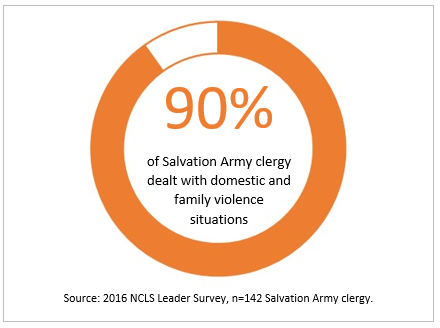
Salvation Army clergy have mainly responded to victims of abuse, rather than to perpetrators
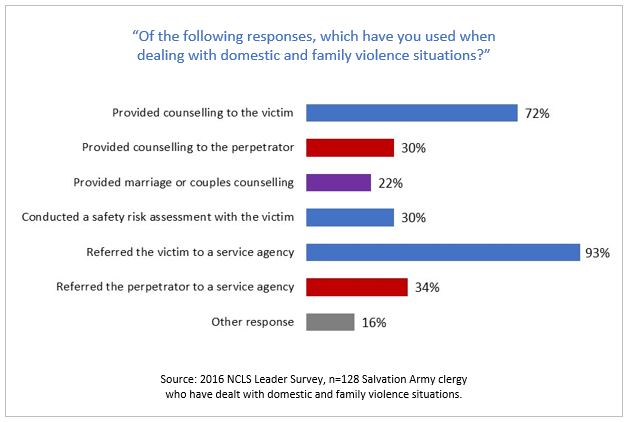
Some 98% of clergy dealt with victims of abuse – by referring them to specialist services (93%), counselling them (72%), and/or much less commonly conducting a safety risk assessment (30%). A large minority of clergy (42%) either referred perpetrators or counselled perpetrators or both (34% referred, 30% counselled).
Around a fifth (22%) provided marriage or couples counselling in relation to DFV situations. Couples counselling is problematic. Victims of domestic violence, and services that support them, maintain that couples counselling is ineffective and unsafe as it fails to address the unequal power in an abusive relationship and can place the victim at increased risk.
Referring the victim to a service agency was the response that was primarily reported in isolation; 83% of Salvation Army clergy who reported only one type of response had done so. Some 89% of clergy who reported one or two types of referred victims to support services, followed by 44% who counselled victims.
Responses that were focused on the perpetrator – namely counselling the perpetrator and referring the perpetrator to a service agency – tended not to be reported in isolation, but rather as part of a set of responses. Very small numbers of clergy who reported one or two responses focused on perpetrators. In contrast, among those who reported three or more types of responses 54% had referred perpetrators to a service agency while 51% had counselled perpetrators.
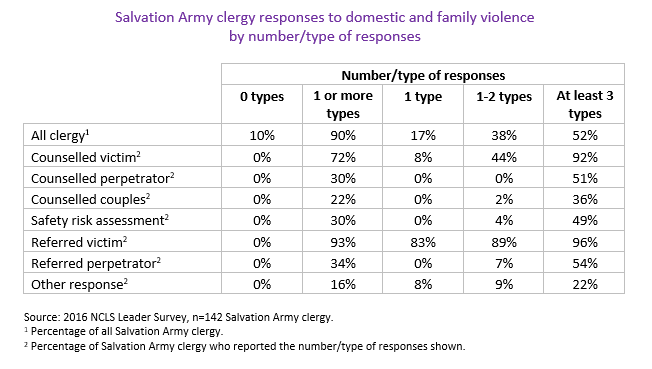
Responses to DFV situations did not differ significantly between clergy aged under 40 years and those aged at least 40. Female clergy were significantly less likely than male clergy to counsel perpetrators, refer perpetrators to support services and counsel couples.
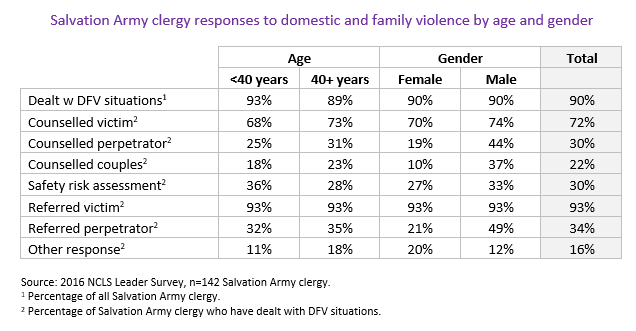
A third of Salvation Army clergy considered themselves to be very familiar with DFV support services
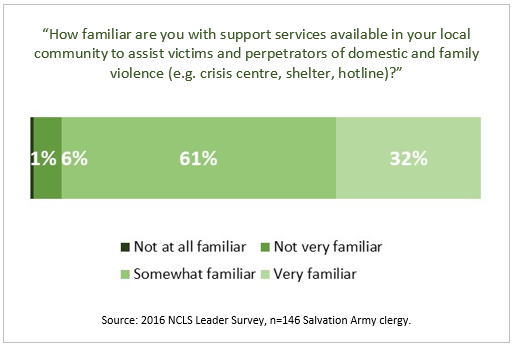
Forming bridges between churches and specialist DFV support services is an important way to equip clergy to better respond to DFV. Almost all clergy considered themselves to be familiar with local DFV support services at least to some degree (somewhat or very familiar), while 32% considered themselves to be very familiar. Familiarity did not vary significantly by age or gender.
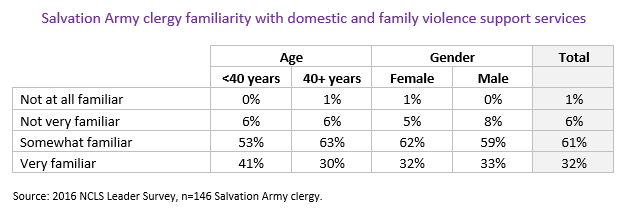
Note: Results are based on n=151 Salvation Army clergy who participated in the 2016 NCLS. Data are unweighted.
Mean age = 48 years, 43% male, 91% Australian-born, 17% with a postgraduate degree. Staff role:
- The minister/pastor/priest of the congregation/parish: 66%
- The senior minister/pastor/priest of ministry team: 14%
- Minister, pastor or priest in a ministry team (not the senior minister): 12%
- Minister/pastor/priest of equal standing in ministry team: 7%
- Interim minister/pastor/priest: 1%
See full paper:
Pepper, Miriam, and Ruth Powell. 2022. "Domestic and Family Violence: Responses and Approaches across the Australian Churches" Religions 13, no. 3: 270. https://doi.org/10.3390/rel13030270



